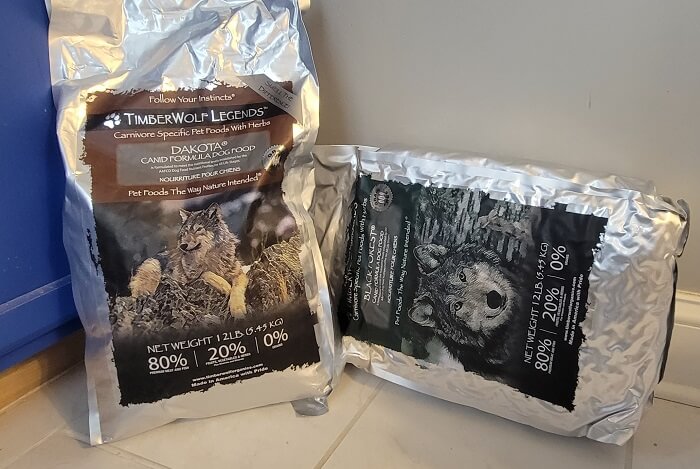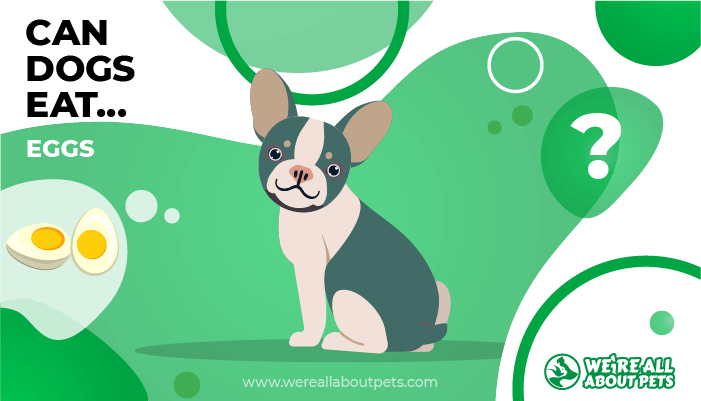Can Dogs Eat Celery?
This page contains affiliate links. We may earn money or products from the companies mentioned in this post through our independently chosen links, which earn us a commission. Learn More

Even though we usually think of our dogs as the descendants of wolves, many of them seem to enjoy salad ingredients. Ingredients such as celery, for example. Not every dog loves celery but many dogs do like these fibrous, crunchy stalks.
But, can dogs eat celery safely? Is it good for your dog to eat celery? It turns out that the answer is yes!
Find out more about celery and your dog in our short guide.
Celery Nutrition Stats
One cup of chopped celery (101 grams) is about the amount of a serving size.
- Calories: 16.2 (1% daily value)
- Protein: 0.7 g (1% daily value)
- Carbohydrates: 3.5 g (1% daily value)
- Fat: 0.2g (0% daily value)
- Fiber: 1.6 g (6% daily value)
- Vitamin A: 453 IU (9% daily value)
- Vitamin C: 3.1 mg (5% daily value)
- Vitamin E (Alpha Tocopherol): 0.3 mg (1% daily value)
- Vitamin K: 29.6 mcg (37% daily value)
- Manganese: 0.1 mg (5% daily value)
- Vitamin B6: 0.1 mg (4% daily value)
- Phosphorus: 24.2 mg (2% daily value)
- Copper: 0.0 mg (2% daily value)
- Sodium: 80.8 mg (3% daily value)
- Zinc: 0.1 mg (1% daily value)
- Selenium: 0.4 mcg (1% daily value)
- Thiamin: 0.0% mg (1% daily value)
- Folate: 36.4 mcg (9% daily value)
- Sugars: 1.8 g
- Potassium: 263 mg (8% daily value)
- Calcium: 40.4 mg (4% daily value)
- Magnesium: 11.1 mg (3% daily value)
- Niacin: 0.3 mg (2% daily value)
- Pantothenic acid: 0.2% mg (2% daily value)
- Riboflavin: 0.1 mg (3% daily value)
- Iron: 0.2 mg (1% daily value)
- Fluoride: 4.0 mcg
- Choline: 6.2 mg
Celery Nutritional Facts At A Glance
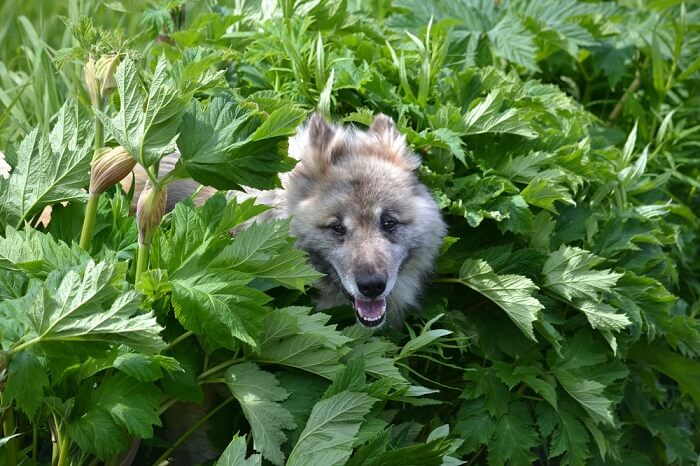
Celery is a good source of magnesium, phosphorus, riboflavin, vitamin B6, pantothenic acid, and calcium. It’s also a very good source of dietary fiber, vitamin A, vitamin C, vitamin K, folate, potassium, and manganese. It’s also low in saturated fat and very low in cholesterol.
On the down side, celery is considered high in sodium among veggies and a large quantity of its calories come from sugars. Overall, celery is made up of 73 percent carbohydrates, 10 percent fats, and 17 percent proteins. It’s far more nutritious than many people realize. For many years it has been valued as a favorite snack food by dieters.
Celery contains about 95 percent water so it eating some can be a good way to stay hydrated. Eating celery can also help you feel full if you are dieting because of the fiber and water content. The dietary fiber in celery will absorb water in your digestive tract, causing you to feel fuller for a longer time.
Celery and celery seeds, in particular, can act as diuretics. Eating lots of celery can cause you to urinate more often.
Celery is also believed to have anti-inflammatory properties due to the phytonutrient antioxidants it contains. Celery is a notable source of flavonols and flavone antioxidants, according to one study. Phytonutrients found in celery include: phenolic acids, flavones like luteolin, flavonols like quercetin and kaempferol, dihydrostilbenoids, phytosterols and furanocoumarins.
According to the Mayo Clinic, inflammation plays a role in autoimmune disorders such as lupus, rheumatoid arthritis, asthma, inflammatory bowel disease, and Crohn’s disease. Cancer and cardiovascular disease can also be influenced by inflammation. These conditions could be possibly be improved by the phytonutrient antioxidants in celery.
Celery is recommended by the American Association of Retired Persons (AARP) as an old-time home remedy for heartburn because of its low acid content.
The fiber in celery is thought to help lower cholesterol levels because it moves cholesterol compounds from the gut through the digestive digestive system until your body removes them in the elimination process.
Several studies have found that a chemical in celery called phthalide may reduce bad cholesterol levels and blood pressure, along with stress hormones. Celery may help lower LDL (bad) cholesterol and triglycerides; and increase HDL (good) cholesterol.
Studies also suggest that the fiber in celery may improve the stomach lining and reduce the risk of gastric ulcers. This might be due to the presence of apiuman, a pectin-based polysaccharide that’s found in celery.
Eating celery may also reduce the risk of gastritis (the inflammation of the stomach lining) because the flavonoids found in celery could help stop the growth of gut bacteria that causes inflammation.
There are risks associated with eating too much celery. Celery has a high sodium content for a vegetable, but it’s still a vegetable. Its sodium content is only high compared to some other vegetables. It’s not as salty as saltine crackers. You should still be careful not to eat too much celery at one time.
Celery is high in fiber. Too much celery can lead to gas, bloating, and diarrhea. Large amounts of raw celery can lead to goiters. That’s because it can interfere with the function of iodine in the thyroid. Goiters can lead to swelling in the neck, breathing problems, and potentially to hypothyroidism.
Celery contains chemicals called psoralens. If you get celery juice on your skin and go in the sun it could result in a rash. Celery allergies are possible. They are similar to birch-mugwort allergies. They can be mild or serious.
Can Dogs Eat Celery?
Yes, dogs can eat celery. Many dogs like the crunch that comes from eating eating raw celery.
There is nothing in celery, the seeds, the stalk, or the celery leaves which will hurt your dog, provided you give it to your dog in moderation. It’s a very healthy treat. Large dogs, small dogs, medium dogs, dogs of all ages — they can all eat celery.
As always, it’s important to cut the celery into small pieces so it won’t pose a choking hazard to your dog. In addition, you should not allow your dog to eat too much celery. Moderation is best.
Is Celery Good for Dogs?
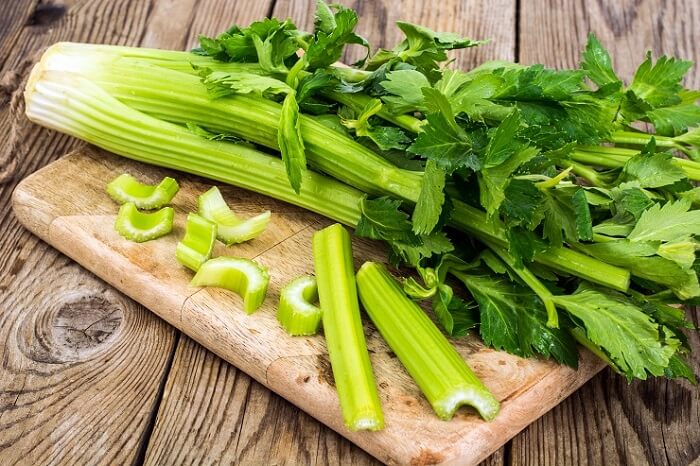
Celery is good for dogs. If you check the labels of some expensive dog foods, you will find that celery is one of the ingredients used in smaller amounts. Celery has been used for thousands of years for medicinal purposes. It has only been used in cooking for a relatively short period of time.
Many of the same celery health benefits that are good for you are also good for your dog. Your dog can benefit from the vitamins, minerals, antioxidants and phytonutrients. The anti-inflammatory properties and dietary fiber are good for your dog.
Celery is also said to improve your dog’s breath when he eats it. And, if you have an overweight dog, you can add a little chopped celery to his dinner. By including the celery with his food it can help him feel full when he eats his food. It will also help him feel full between meals to help with weight loss.
How Much Celery Can Dogs Eat?
Celery is very low in calories. This is an instance where you should only give your dog a small amount of celery. If you give your dog 10 percent of his calories from celery, it will likely be too much vegetable matter in his diet.
For example, if your dog weighs approximately 30 pounds and requires 800 calories per day, he could have as much as 80 calories in dog treats and snacks with some foods.
However, because celery only has 16 calories per chopped cup, the result would be far too much celery for your dog to safely eat. If you give your dog five cups of chopped celery at one time as a treat, he will be urinating all night from the water content in the celery.
Eating too much of the high fiber in celery in a short time can lead to an upset stomach with symptoms such as gas, bloating, and diarrhea.
Basically, if your dog eats too much celery he can be very uncomfortable or sick.
How Often Can Dogs Eat Celery?
If your dog likes celery you can let him have a small amount two or three times per week.
The Correct Diet Is Important
Dogs need to eat the correct diet for good health. All dogs need good quality protein and fat appropriate for their age, lifestyle, and health condition in order to thrive.
Most healthy dogs need the following things in their diet:
- Good Sources of Protein- Meat, fish, poultry, and eggs are all good sources of animal protein. Animal protein is generally easier for dogs to digest. The more accurately the protein is identified on the label, the better.
- Good Sources of Fat- Fat provides essential fatty acids (EFA) and helps distribute the fat soluble vitamins A, D, E, and K so your dog can absorb them easily.
- Named Ingredients- Named ingredients are usually better than generic ingredients. The more specific, the better, so you know precisely what your dog is eating.
- Low to Moderate Carbohydrates- Most experts recommend diets that contain low to moderate amounts of carbohydrates. Carbohydrates are not “bad” for dogs but they should not be used as a substitute for protein. Many carbs do double duty as dietary fiber and probiotics.
- Avoid Artificial Preservatives, Colors, and Sweeteners- Artificial preservatives and colors/dyes have been linked to some health problems in humans and animals. You should try to avoid these ingredients in dog foods.
- AAFCO- AAFCO is the Association of American Feed Control Officials. AAFCO sets voluntary standards for pet food labeling. Look for foods that have these minimum standards.
- Fresh Water- All dogs need access to fresh water unless they are ill or have some other reason to be temporarily kept away from water. For example, if you are house training your puppy, you can safely put away water overnight.
If your dog has health problems of any kind, please see a veterinarian for dietary advice. Regular diets may need to be adjusted. Your dog may not be able to eat some fruits and vegetables so ask your vet.
What Are Other Healthy Alternatives to Celery in a Dog’s Diet?
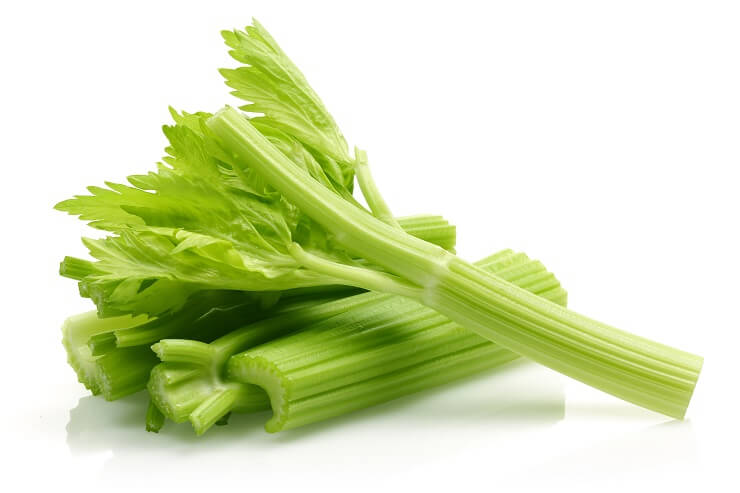
Celery makes a good snack for your dog but there are many other healthy foods you can give your dog in small amounts.
You should consider these human foods as occasional treats. Check with your veterinarian if your dog has any health issues and you are concerned about giving any of these foods. Remember that not all parts of a fruit or vegetable are safe for dogs in some cases.
- Apples
- Asparagus
- Avocados
- Bananas
- Bell pepper
- Broccoli
- Brussels sprouts
- Carrots
- Cauliflower
- Cucumbers
- Green beans
- Mangos
- Oranges
- Parsnip
- Pears
- Pineapple
- Pumpkin
- Strawberries
- Summer squash
- Sweet potato
- Tomatoes
- Watermelon
- Zucchini
How Do You Give Your Dog Celery?
Raw or uncooked celery is more nutritious than celery that has been cooked. In general, the longer you cook celery, the more nutrition it loses. Most people cut up celery into small bite-size pieces to give to their dog. The smaller the dog, the smaller the pieces. Celery can be a choking hazard unless you make the pieces very small.
You can also cut up celery into small pieces and mix it with your dog’s food. This can be a good way to give celery if your dog is dieting.
For a special treat you can put a dab of peanut butter on a piece of celery for your dog. Most dogs will go crazy for this combination.
Conclusion
Many dogs love celery and it’s good for them in moderation. Don’t feed your dog too much celery too often. It could result in gastric distress such as gas, diarrhea, and bloating. Small quantities should not be a problem. Celery is also a good dog snack if your dog needs to lose a little weight.







